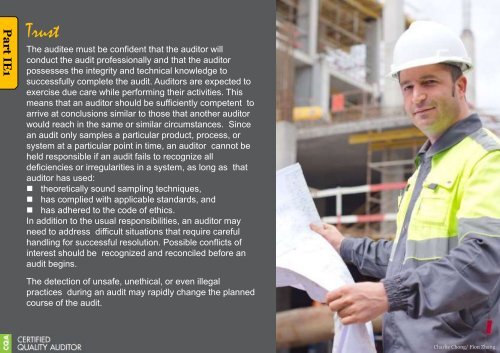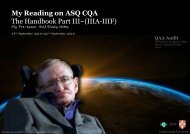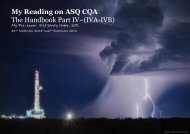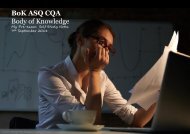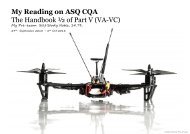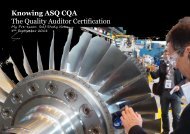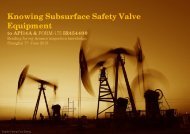- Page 1 and 2:
My Reading
- Page 3 and 4:
闭 门 练 功 Charlie Chong/ Fion
- Page 5 and 6:
闭 门 练 功 Charlie Chong/ Fion
- Page 7 and 8:
ASQ Mission: The American Society f
- Page 9 and 10:
Content: • My <s
- Page 11 and 12:
Notes to the Reader This handbook s
- Page 13 and 14:
The Contents The handbook is organi
- Page 15 and 16:
Keywords: • development of this h
- Page 17 and 18:
Acknowledgments ASQ Audit Division
- Page 19 and 20:
HACCP (Hazard Analysis and Critical
- Page 21 and 22:
Quality Auditing Technical Committe
- Page 23 and 24:
Figure I.1 Types of audits. Source:
- Page 25 and 26:
Audits: Audits First Party Second P
- Page 27 and 28:
1980s 历 史 的 回 顾 El Salvad
- Page 29 and 30:
1980s 历 史 的 回 顾 Mujahedee
- Page 31 and 32:
The handbook discusses all types of
- Page 33 and 34:
Audits are conducted only when some
- Page 35 and 36:
Scenario Auditors Are Not Inspector
- Page 37 and 38:
Part I Auditing Fundamentals [27 of
- Page 39 and 40:
Part IA1 Types of Quality Audits Bu
- Page 41 and 42:
Part IA1 Product audit A product au
- Page 43 and 44:
Part IA1 Product Audit: Elements ex
- Page 45 and 46:
Part IA1 Product Audit: Elements ex
- Page 47 and 48:
Part IA1 A product audit is the exa
- Page 49 and 50:
Part IA1 Product Audit: For other s
- Page 51 and 52:
Part IA1 Process audit The process
- Page 53 and 54:
Part IA1 Process Audit Technique. A
- Page 55 and 56:
Part IA1 Desk Audit Or Document Rev
- Page 57 and 58:
Part IA2 No Absolute Rule Figure 1.
- Page 59 and 60:
Part IA2 Brainstorming is a group c
- Page 61 and 62:
Part IA2 Second-Party Audit A secon
- Page 63 and 64:
Part IA2 A survey, sometimes called
- Page 65 and 66:
Part IA2 A survey, sometimes called
- Page 67 and 68:
Part IA2 • A third-party audit is
- Page 69 and 70:
Part IA2 Government representatives
- Page 71 and 72:
Part IA2 Government representatives
- Page 73 and 74:
Part IA2 An auditor told of one cas
- Page 75 and 76:
Part IA3 Types of Quality Audits/Pa
- Page 77 and 78:
Part IA3 Certification Purposes Com
- Page 79 and 80:
Part IA3 Conformité Europeene Mark
- Page 81 and 82:
Part IA3 What’s the difference be
- Page 83 and 84:
Part IA3 What’s the difference be
- Page 85 and 86:
Part IA3 Accreditation Certificates
- Page 87 and 88:
Part IA3 Certification/Registration
- Page 89 and 90:
Part IA3 Certification/Registration
- Page 91 and 92:
Part IA3 Performance versus Complia
- Page 93 and 94:
Part IA3 The mission of the ASQ Aud
- Page 95 and 96:
Part IA3 CAPA: The analytical aspec
- Page 97 and 98:
Part IA3 Preventive Action .. preve
- Page 99 and 100:
Part IA4 Audits can address almost
- Page 101 and 102:
Part IA4 Input & Output Input Audit
- Page 103 and 104:
Part IA4 Corrective Action And Its
- Page 105 and 106:
Part IB Audit Reason An audit can p
- Page 107 and 108:
Part IB Second-party supplier audit
- Page 109 and 110:
Part IB IB1. Elements Of Purpose An
- Page 111 and 112:
Part IB First- Party Audit The purp
- Page 113 and 114:
Part IB The Management Standards Th
- Page 115 and 116:
Part IB Meal Time 今 天 晚 餐
- Page 117 and 118:
Part IB Risk- Based Auditing Some a
- Page 119 and 120:
Part IB • Who determine the purpo
- Page 121 and 122:
Part IB Most third-party audits are
- Page 123 and 124:
Part IB The Purpose Of The Third- P
- Page 125 and 126:
Part IB The following list provides
- Page 127 and 128:
Part IB IA-Gossip What’s the diff
- Page 129 and 130:
Part IB IA-Gossip- Learn from https
- Page 131 and 132:
Part IB IT Risk Universes Charlie C
- Page 133 and 134:
Part IB …For statutory issues, in
- Page 135 and 136:
Part IB Auditing Benefits Identific
- Page 137 and 138:
Part IB The Shewhart control chart
- Page 139 and 140:
Part IB 5 Whys is an iterative inte
- Page 141 and 142:
Part IB Milwaukee Charlie Chong/ Fi
- Page 143 and 144:
Part IC Audit Division of ASQ versu
- Page 145 and 146:
Part IC Criteria The audit principl
- Page 147 and 148:
Part IC Performance Standards Perfo
- Page 149 and 150:
Part IC Audit Basis (Confusion Term
- Page 151 and 152:
Part IC An organization may volunta
- Page 153 and 154: Part IC Laws and Regulations (Audit
- Page 155 and 156: Part ID Chapter 4 Roles and Respons
- Page 157 and 158: Part ID External Audit The followin
- Page 159 and 160: Part ID The Great Depression Charli
- Page 161 and 162: Part ID The Great Depression Charli
- Page 163 and 164: Part ID Audit Process Participants
- Page 165 and 166: Part ID List of Responsibilities an
- Page 167 and 168: Part ID 7.2.2 Personal behavior Aud
- Page 169 and 170: Part ID Auditee a. Coordinates audi
- Page 171 and 172: Part IE Chapter 5 Professional Cond
- Page 173 and 174: Part IE1 IE1. Professional Conduct
- Page 175 and 176: Part IE1 Codes of ethics The purpos
- Page 177 and 178: Codes of ethics The purpose of the
- Page 179 and 180: Part IE1 https://asq.org/about-asq/
- Page 181 and 182: Part IE1 The Institute of Internal
- Page 183 and 184: Part IE1 The Institute of Internal
- Page 185 and 186: The Institute of Internal Auditors
- Page 187 and 188: Part IE1 Conflict of Interest Exist
- Page 189 and 190: Part IE1 • When a Conflict of Int
- Page 191 and 192: Part IE1 Confidentiality With proce
- Page 193 and 194: Part IE1 IE2-Gossip An auditor was
- Page 195 and 196: Part IE1 Conduct Discussing proprie
- Page 197 and 198: Part IE1 Conduct For example, when
- Page 199 and 200: Part IE1 Techniques Several techniq
- Page 201 and 202: Part IE1 Techniques Several techniq
- Page 203: Part IE1 Security Companies in cert
- Page 207 and 208: Part IE1 Trust The detection of uns
- Page 209 and 210: Part IE1 IE1-Gossip Some products m
- Page 211 and 212: Part IE1 Discovery Of Illegal Or Un
- Page 213 and 214: Part IE1 When an unsafe practice is
- Page 215 and 216: Part IE1 whistle- blower laws. A wh
- Page 217 and 218: Part IE1 An auditor may encounter i
- Page 219 and 220: Part IE1 An auditor may encounter i
- Page 221 and 222: Considering New Employment. An audi
- Page 223 and 224: IE1-Gossip One example of an unethi
- Page 225 and 226: IE1-Gossip During the course of an
- Page 227 and 228: Part IE1 Overcoming Language And Li
- Page 229 and 230: IE1-Gossip An auditor was shown doc
- Page 231 and 232: Part IE1 • Remedial Action/ Conta
- Page 233 and 234: Part IE2 Figure 5.5 Illegal auditor
- Page 235 and 236: Part IE2 Figure 5.5 Illegal auditor
- Page 237 and 238: Part IE2 The Auditor as an Agent As
- Page 239 and 240: IE2-Gossip An auditor discovers tha
- Page 241 and 242: IE2-Gossip During an FAA audit of a
- Page 243 and 244: IE2-Gossip Discovery is a pretrial
- Page 245 and 246: Part IE3 IE3. Audit Credibility Aud
- Page 247 and 248: Part IE3 The auditor can establish
- Page 249 and 250: Part IE3 Audit Ethics Audit ethics
- Page 251 and 252: Part IE3 5.Independence: the basis
- Page 253 and 254: Part IE3 A good auditor does not ha
- Page 255 and 256:
Part IE3 IE3-Gossip In a closing me
- Page 257 and 258:
Part IE3 IE3-Gossip I am familiar w
- Page 259 and 260:
Part II Audit Process [42 of the CQ
- Page 261:
t least one academic expert recomme


